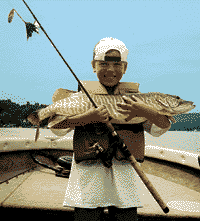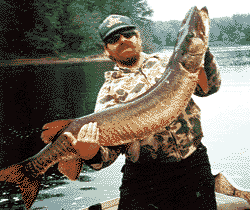Muskies? In New Jersey? You bet! Thanks to the efforts of Muskies Inc. NJ, a non-profit conservation organization and the New Jersey Division of Fish and Game, quality muskie fishing can be found in many Garden State waters. More muskies are being caught today than ever before.
 One
of NJ's premier muskie fisheries can be found on the Delaware River from
the Delaware Water Gap north to the State line at Port Jervis, New York.
Public boat launch facilities, maintained by the National Park Service,
are located at the "Gap", Smithfield Beach, Bushkill, Dingman's Ferry,
and within the boundaries of the Delaware Water
Gap National Recreation Area. This extensive area of Federally owned
land offers access for shore-bound anglers as well.
One
of NJ's premier muskie fisheries can be found on the Delaware River from
the Delaware Water Gap north to the State line at Port Jervis, New York.
Public boat launch facilities, maintained by the National Park Service,
are located at the "Gap", Smithfield Beach, Bushkill, Dingman's Ferry,
and within the boundaries of the Delaware Water
Gap National Recreation Area. This extensive area of Federally owned
land offers access for shore-bound anglers as well.
This section of the river is composed of long slow pools interconnected by shallow riffles and rapids. Some stretches contain deep holes, gravel bars, weedbeds, islands, and tributary stream. Good fishing locations are straightforward and fairly easy to locate. Slack water areas are the key. Look for them on the downstream side of islands, below shoals and particularly downstream of rocky points and bars which deflect current flow. Eddies are also formed below inside river bends and alongside riffs. The junction of feeder streams will also hold muskies. man made structures such as bridge abutments and wing dams can also hold muskies. If any of these areas contain downed timber, they are particularly attractive to fish. As the water warms, emerging weedbeds will also be prime fishing areas.
Without a doubt, the elusive muskellunge is the king of freshwater predators and the ultimate trophy. They can grow to massive proportions and will eat anything they can get their razor sharp teeth into. Muskies have been caught in the Delaware River in excess of fifty inches in length and weighing over forty pounds! The current New Jersey State record weighed in at a whopping 42 lbs., 13 ounces.
Muskie fishing generally starts in the late spring when the water temperature reaches the mid-60 degree range. The warming water increases the muskie's metabolic activity and has them on the lookout for their favorite prey. Chubs, suckers, carp, and eels are all part of the muskie's diet.
Some specialized tackle is needed to pursue muskies. Most muskie fishermen choose a medium-heavy casting rod with a level wind reel. Spool up with thirty-pound test, low-stretch line and you will be ready to go. Don't forget to use a high quality steel leader to protect your line from a muskie's razor sharp teeth!
This is the time to break out the largest lures in your tackle box. Crank baits, surface lures, and spinners are all good choices, but a special muskie lure called a "jerkbait" is probably the best type of lure to use. These are available in many bait shops and tackle stores along the river.
 There are a few guides who specialize in muskie fishing on the Delaware
River. Their knowledge of the river, its habitats, and the techniques
used to catch muskies will vastly increase your chance of catching one
of these elusive giants. If you are considering a guide, be sure he is
licensed and has a reputations for being a good instructor as well as
being able to put you on the fish.
There are a few guides who specialize in muskie fishing on the Delaware
River. Their knowledge of the river, its habitats, and the techniques
used to catch muskies will vastly increase your chance of catching one
of these elusive giants. If you are considering a guide, be sure he is
licensed and has a reputations for being a good instructor as well as
being able to put you on the fish.
There is a strong catch-and-release ethic among the muskie fishing fraternity. This has greatly increased the opportunity for everyone to experience the thrill of seeing a muskie engulf your lure at boatside. Forty-five inches of muskie hitting on twelve inches of line is something no angler can ever forget. A photograph or a graphite replica makes an excellent trophy and remembrance of your fish. So remember: "Let 'em go and let 'em grow!"